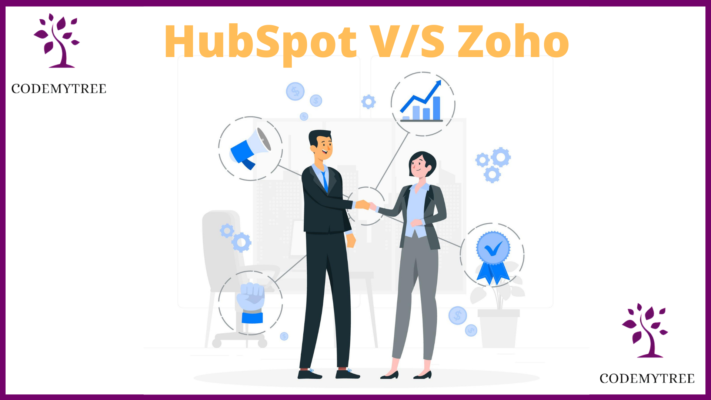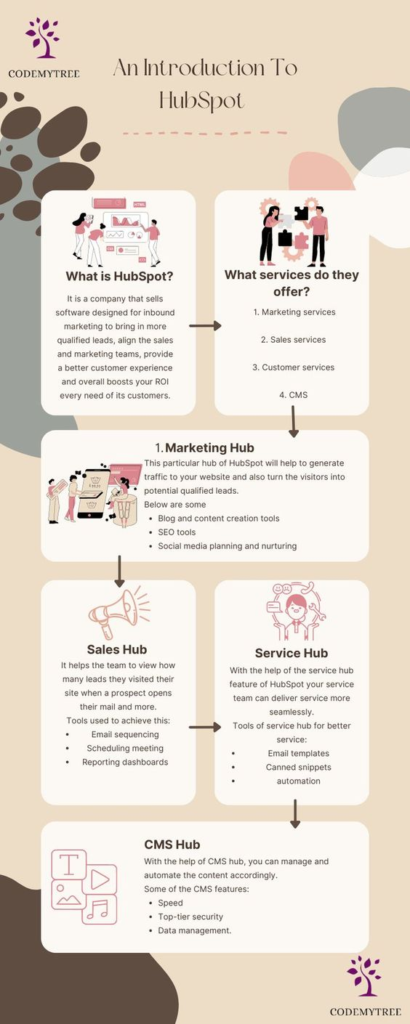
HubSpot, Zoho, and Salesforce are customer relationship management software that aims to assist you in effectively reaching your organizational goals. This software provides all your business functionalities such as Sales, Marketing, Service, and CMS on one easy-to-use platform.
The three platforms are neck-to-neck competitors due to the similarities in the features and tools they offer. All three are Marketing Automation Tools that increase the efficiency of your business and make them work to its best capacities. In this article, we will discuss 5 main components which will help us differentiate between the three applications. The 5 topics are-
- Pricing
- Key Features
- Automation Tools
- Level Of Ease
- Customer Support
But before we get into the topics, let us get to know each platform individually.
What Is HubSpot?
HubSpot is an all-in-one platform that aims to solve all the possible problems that your business might be facing in different sectors be it Sales, Marketing, or Service. Different hubs cater to help you reach the desired goals of your company. The hubs are named HubSpot Marketing Hub, HubSpot Sales Hub, HubSpot Service Hub, CMS Hub, and HubSpot Operations Hub. Additionally, the sync and coordination between all these hubs help keep your decision data-driven and appropriate. Furthermore, the robust tool has one main feature which is its ability to connect the CMS tools to the main HubSpot system without increasing the complexities.

What Is Zoho?
Just like HubSpot, Zoho is a CRM platform that consists of all the tools you need to achieve your company’s goals. It also has tools ranging from service to sales to marketing that help to minimize your efforts and maximize the profits of your company. In addition, it also has a great email automation tool as one of its main features.
What Is Salesforce?
Just like HubSpot and Zoho, Salesforce is also a CRM platform that helps you automate your business and make it work to its full potential and therefore has desired outputs.
A Comparison Between HubSpot, Zoho, And Salesforce
It is extremely difficult to choose between three things that are so similar in their functions but we will still try to get the best option out of the three. It’s equivalent to going shopping and liking three white shirts from different brands. You become perplexed as to which one is the best purchase for you. But then you start analyzing different factors related to the product. Similarly, we are going to do the same here.
There are many things to check before proceeding with the one that suits your requirements perfectly. The first step while selecting anything is making a list and that is exactly what we are going to do. I have listed the 5 topics above, so let’s cut to the chase.

1. Pricing
When it comes to comparing between three things the best option to compare them is based on price. We will see what each automation software serves to the plate and what is the pricing of the plate.

From the above picture, we can conclude that in terms of budget Zoho is convenient. But there’s a downside, Zoho is limited in its free plan while with HubSpot you have various tools available at your disposal. You will need to get your wallet if you want more advanced features ultimately. Also, Zoho is pocket friendly and convenient when it comes to small businesses.
Verdict– We can conclude from the above illustrations that HubSpot is the perfect option for any size business as the features it offers are remarkable at the pricing.
2. Key Features
The key features which all three CRM platforms share are the following:
- Contact management
- Lead management
- Sales forecasting
- Email marketing
Besides these, two features can help to draw a comparison between them. Those features are order management and customization. Regarding order management, HubSpot has the upper hand since this feature allows you to track the entire consumer journey from start to end which in turn permits you to resolve any issue on the way.
While HubSpot excels in order management, Zoho excels in customization. Its Sales, Marketing, and Social media are more extensive than HubSpot. It includes custom-built wizards to streamline extensive data entry as well as take voice commands to retrieve critical data. Furthermore, its contact management feature takes the bait over HubSpot since you are permitted to add up to 100,000 contacts regardless of your plan.
Verdict– We can conclude here that under this category you should decide as per the requirements of your own company as to which is the better option. If you are looking for better management then HubSpot is the choice for you and if you want customization then Zoho is the choice for you.
3. Capabilities Of Automation Tools
While searching for software, you need to analyze its Marketing and Sales automation tools because they will ease your work. In this, all three HubSpot, Zoho, and Salesforce are again neck and neck with each other. The sales automation capabilities of HubSpot, Salesforce, and Zoho are fairly similar. Their sales modules include leads, contacts, accounts, and deals. Either CRM system can log and track tasks, calls, notes, events, and other unique records.
There are, however, some advanced features in the Zoho CRM platform, such as scoring rules, assignment rules, and currencies. To generate leads efficiently, these features are crucial. An example of lead scoring is the ability to determine whether a piece of information is ‘warm’ or ‘cold’, which will allow you to prioritize future interactions with customers accordingly. But on the other hand, we have HubSpot with its exceptional marketing capabilities. HubSpot offers a variety of tools for e-mail marketing. Also, the coordination between the sales and marketing hub is phenomenal as it tells you that if a potential lead is not converted then which team has to work more. Additionally, we have a lot of HubSpot integrations with third-party applications that are offered by HubSpot which allows you to share the data and resources between all your platforms.
Verdict– We can conclude here that HubSpot is the better option because of a lot of features offered by it.
4. Level Of Ease
HubSpot’s user interface is more convenient than that of Zoho and Salesforce. The setup and integration are simple and are loved by its customers. In contrast, Zoho does have navigation features but the UI feels outdated and complex to its users. Salesforce also lacks when it comes to the user interface. While the prices increase so does its complexity but HubSpot keeps the user interface simple and integrated.
Verdict– HubSpot is the clear winner here.
5. Customer Support
All three HubSpot, Salesforce, and Zoho have remarkable customer support. They have online communities and forums to help guide their customers. Zoho provides e-books and how-to guides similarly HubSpot provides an academy where you can learn the uses and features of the platform. Similarly, Salesforce also guides all its customers to use the platform effectively. Furthermore, Zoho has free live chats and calls with their experts.
HubSpot’s support system and quality are excellent compared to any enterprise software platform. You have the availability of the chatbot 24*7 at your service. Though the support comes at a cost, it is worth every penny.
Verdict– Again HubSpot is the clear winner here.
Conclusion
When it comes to CRM selection, it is up to your requirement. With its affordable price, basic features, and flexibility, Zoho CRM is an excellent choice for businesses that require customer relationship management software. Salesforce also serves a decent purpose. However, HubSpot can be an even better choice in a lot of cases. Besides its CRM capabilities, HubSpot also comes with a wide range of marketing features. When it comes to an all-in-one CRM that offers a comprehensive set of marketing tools, HubSpot is the better option. The added functionality may outweigh the cost of Zoho CRM.